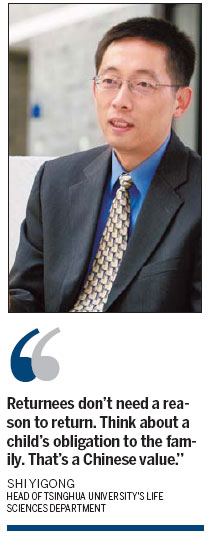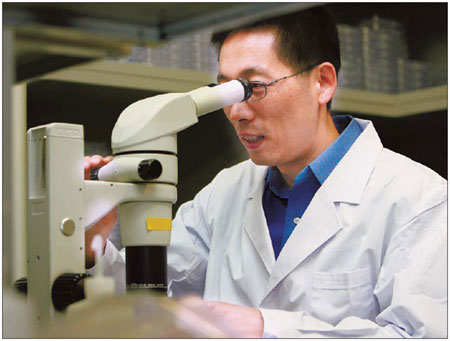Returning talent gives country boost
|
Shi Yigong resigned from the faculty of Princeton University and returned to Beijing to become the head of Tsinghua University's life sciences department. Photos Provided to China Daily |

Scientist trusts his return from the United States sets an example for Chinese students overseas. Ariel Tung reports.
Shi Yigong had it all. Or so people thought. He became a pioneer in the use of X-ray crystallography and the study of the death of cancer cells. He became the youngest-ever full-time professor at Princeton University's department of molecular biology at the age of 36 with a massive laboratory floated by a $2 million annual budget.
He co-founded a drug-discovery company called TetraLogic Pharmaceuticals, in Malvern, Pennsylvania.
Then in 2008, the 18-year resident of the United States gave it all up.
He turned down a $10 million research grant from the Howard Hughes Medical Institute in Maryland and moved back to Beijing to become the head of Tsinghua University's life sciences department. His colleagues in the US called him crazy.
"If you have a watermelon, will you care about losing a sesame seed?" he asks. "No, I don't regret giving up what I had. Coming back to China was a much bigger goal for me."
Shi is arguably the most well-known face in a growing group of Chinese talent returning to the mainland. From 1978 to 2009, the number of students studying abroad reached about 1.6 million with about 500,000 restarting their careers in China by 2009.
It's part of China's long-term strategy to keep its homegrown minds. The nation has been implementing a strategy - called the Medium and Long-term Talent Development Plan (2010-2020) - of developing its students through science, technology and education. The government believes that its homegrown talent overseas comprises a resource that can propel China's drive to modernize.
But what inspired Shi to move back to China after spending a big part of his life in the US? Shi says he believes things will be better for him as the dean of life sciences at Tsinghua.
"In the US, my lab was pretty big. I had more than 20 full-time employees. I had a huge budget," he says. "Am I getting more money from the Chinese government? No. My budget is a small fraction of what I had at Princeton. But expenses are lower in China. My Tsinghua lab has more people. So I'm able to maintain a bigger lab with fewer research funds."
Echoing the government's call for Chinese talents to come home, Shi urges overseas Chinese scientists to return because "they will be more likely to excel in research in China than in the US". "The number of top scientists in China is far fewer than those in the US. For any talented scientists, whether young or old, their chances of obtaining research funds, making research breakthroughs and getting recognized in China far exceed their chances in the US," he says.
Shi says he has already built a world-class lab at the university and his cancer research has expanded significantly.
"Students here at Tsinghua are as motivated and hardworking as those in my former Princeton lab. I've instigated a new way of research collaboration in my own lab. I group my PhD students in two- or three-persons teams, with each team tackling an important research problem. I believe this approach will give us a better chance for a breakthrough."
Shi, who grew up in the countryside of Henan province, says he is also interested in influencing the values and ideas of his students at Tsinghua and of younger generations. He occasionally travels to Wuhan, Shanghai and Guangzhou to give lectures to students.
"The younger generations probably need advice from my generation because China is very different from the time I grew up. The young people these days are immersed in a material life - Internet, movies, fashion and many things that used to be a luxury in the '70s and '80s. They have a much better life now but they have smaller sense of responsibility to the country," he says.
The self-professed patriot says his lectures and his return to China is merely his part as a Chinese to improve the system.
"China's technology is way behind that of advanced societies. We all know that Chinese people are intelligent, driven and hardworking. They have all the qualities to make China more prosperous. One way to do that is to attract top talents back to China and improve its science and technology," he says.
"In a way, I don't feel that my return to China is unusual. There's nothing special about it. We studied and worked in the US and returned to China. That should be the normal case. Returnees don't need a reason to return. Think about a child's obligation to the family. That's a Chinese value. Your parents took care of you when you were young. When you grow up, you take care of your parents."
He admits that it will take courage for one to leave his or her comfort zone, especially when everything is well established in the US. Sometimes, he says, frustrations are unavoidable in terms of lifestyle, air quality, traffic congestion and smoking in public places.
But he says his wife and his 7-year-old twin children are happy and satisfied with the quality of life in China. He made it easier for them by having everything ready in their rented apartment when they joined him nearly two years ago.
Although Shi says his education in the US contributed tremendously to his achievements, he would encourage only half of his students to follow his footsteps.
He agrees that studying abroad has the advantage of immersing oneself in a different culture. But he hopes that those who choose to study and work abroad will ultimately return - like he did.



















